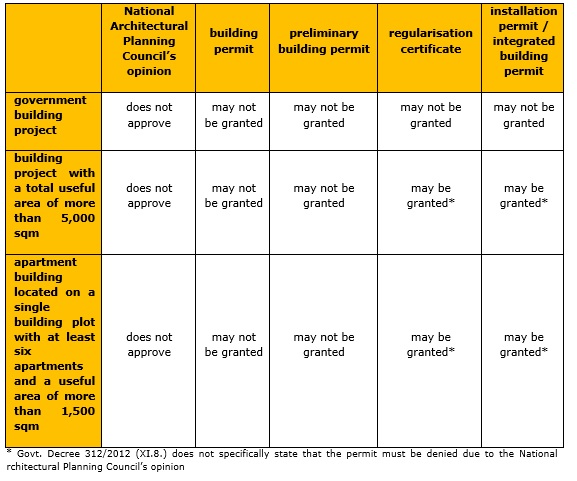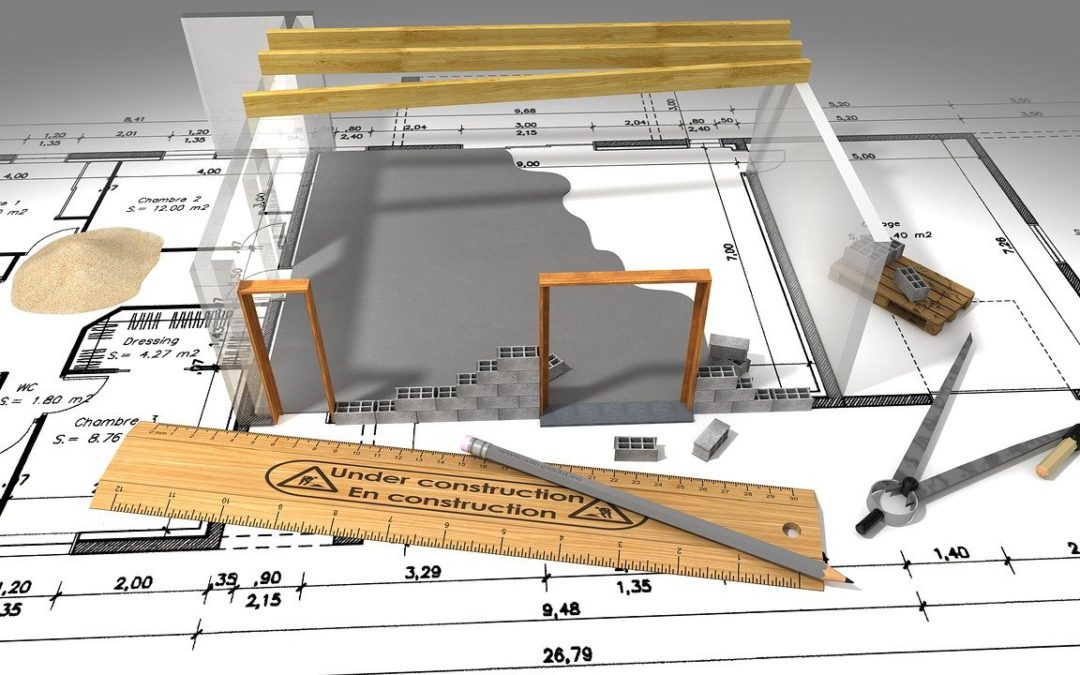Buildings with a total useful area of more than 5,000 sqm and apartment buildings located on a single building plot with at least six apartments and a total useful area of more than 1,500 sqm will not receive a preliminary or final building permit in procedures started after 16 August 2022 if they are not recommended by the National Architectural Planning Council on the basis of the relevant architectural and technical documentation.
Opinion, i.e. veto
Government Decree No. 315/2022 (VIII.16.) on the modification of certain construction, cultural heritage protection, asset management and government administration decrees (“Modification Decree”) has extended the powers of the National Architectural Planning Council.
Starting from 17 August 2022, the National Architectural Planning Council has had the power to review and evaluate the architectural and technical documentation of government building projects within the meaning of Act CXXXVIII of 2018 on Government Building Projects as well as the the architectural and technical documentation of buildings with a total useful area of more than 5,000 sqm and apartment buildings located on a single building plot with at least six apartments and a total useful area of more than 1,500 sqm. [Modification Decree, Sections 1(1)-(4); Govt. Decree No. 252/2006. (XII. 7.), Sections 9(2)g) and 9(2a)]
The Modification Decree has introduced stricter rules with regard to building permission procedures by essentially granting veto powers to the National Architectural Planning Council, because building authorities, starting from 17 August 2022, have been required to deny applications for preliminary and final building permits where the National Architectural Planning Council does not recommend the relevant architectural and technical documentation of
- government building projects within the meaning of Act CXXXVIII of 2018 on Government Building Projects;
- projects concerning the construction of buildings with a total useful area of more than 5,000 sqm; and
- projects concerning the construction of apartment buildings located on a single building plot with at least six apartments and a useful are of more than 1,500 sqm
for permission. [Modification Decree, Sections 4(1) and (2); Govt. Decree No. 312/2012 (XI.8.), Sections 18(4)c) through e), Sections 25(3)c) through e)]
The Modification Decree has also granted veto powers to the National Architectural Planning Council in connection with regularisation certificates, installation permits and integrated building permits, but only with regard to government building projects. [Modification Decree, Sections 4(3) and (5)b); Govt. Decree No. 312/2012 (XI.8.), Sections 33(1), 35(9) and 44(1)b)]
It is important to note that the National Architectural Planning Council may, at the recommendation of its Chairman, propose that a particular evaluation procedure should be completed by the competent Regional Architectural Planning Council. If the proposal is accepted, the evaluation procedure will be completed by that Regional Architectural Planning Council. [Modification Decree, Section 1(4); Govt. Decree No. 252/2006 (XII. 7.), Section 9(6a)]

The National Architectural Planning Council may also evaluate ongoing government building projects, and its evaluation must be taken into account in the relevant building permission procedures. [Modification Decree, Sections 1(3) and 4(4); Govt. Decree No. 252/2006 (XII. 7.), Section 24; Govt. Decree No. 312/2012 (XI. 8.), Section 77/G]
It should be pointed out that similar veto powers were introduced in what was popularly known as “plaza stop” legislation, i.e. rules that were designed to put a stop to shopping mall construction projects. The relevant rules have been modified several times but are still in effect, and apply to the construction, alteration and extension of commercial buildings (department stores and shopping malls) with a floor space of more than 400 sqm, where the leader of the Hajdú-Bihar County Government Office has been appointed as the authority on whose evaluation building permission procedures and change of function procedures must be based. [Act LXXVII of 1997 on the Development and Protection of the Built Environment, Chapter IV/A, Govt. Decree 5/2015 (I. 29.)]
Therefore, the National Architectural Planning Council will become key participant in permission procedures concerning larger buildings, and this will probably have a remarkable effect on office and apartment building development projects.
What criteria does the National Architectural Planning Council examine?
In its evaluation, the National Architectural Planning Council will examine whether an architectural and technical plan complies with
- the requirements of architectural quality and professional standards, including, in particular, the requirements of integration with cityscapes, aesthetic appearance, beneficial impact on cityscapes and urban structures, as well as visibility and reverse viewshed analysis;
- the requirements stated in the the cityscape decree and the statements and recommendations included in the underlying cityscape manual;
- cultural heritage protection requirements, if appropriate;
- the requirements stated in the relevant world heritage management plan or, in the absence of the same, in Section 3(4) of Hungary’s Act LXXVII of 2011 Act on World Heritage Sites, if appropriate. [Govt. Decree 252/2006 (XII. 7.), Section 15(2)]
The National Architectural Planning Council must explain its evaluation, and the explanation must include references to the regulations that served as the basis for the evaluation. The explanation must also include a description of the analysis carried out on the basis of the above criteria, and its outcome. If the National Architectural Planning Council does not recommend the the documentation for permission, it must also provide a list of recommended modifications that should be considered in a revision of the documentation. [Govt. Decree 252/2006. (XII. 7.), Sections 16(1), (2a) and (3)]
In its evaluation, the National Architectural Planning Council will either recommend the documentation for permission and, by extension, the relevant project for completion with our without qualifications, or deny such recommendation. [Govt. Decree 252/2006 (XII. 7.), Section 16(2)]
As an interesting side note, we would point out that the government may issue a decree and exempt a project from the National Architectural Planning Council’s evaluation procedure if it is related to a matter that has strategic importance for the national economy. Such matters can include, for example, public administration matters specified by the government in a decree in connection with investments projects that are worth at least 90 million forints and expected to create at least 15 jobs, and investment projects that are funded, fully or partially, from state aid awarded in a specific government decision. [Govt. Decree 252/2006 (XII. 7.), Section 9(2)b); Act LIII of 2006, Section 1(1)]
Authors: András Fenyőházi and Zsanett Szabó




